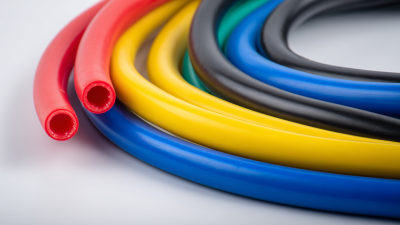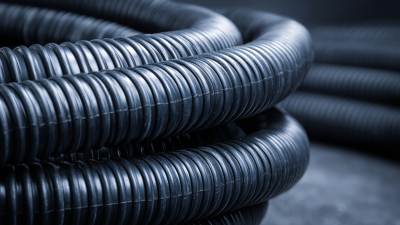In the ever-evolving landscape of industrial applications, the selection of appropriate materials can significantly impact operational efficiency and safety. Among these materials, the Rubber Suction Hose has emerged as a preferred choice, thanks to its unparalleled flexibility and durability.
 According to a recent market report, the global rubber hose market is projected to reach $4.5 billion by 2025, driven by increased demand across various industries, including agriculture, construction, and mining. The advantages of utilizing Rubber Suction Hose are manifold; they not only provide exceptional resistance to wear and tear but also offer superior performance in handling abrasive materials. As industries strive for greater efficiency and reduced downtime, understanding the compelling reasons for choosing Rubber Suction Hose can lead to more informed decisions and enhanced productivity.
According to a recent market report, the global rubber hose market is projected to reach $4.5 billion by 2025, driven by increased demand across various industries, including agriculture, construction, and mining. The advantages of utilizing Rubber Suction Hose are manifold; they not only provide exceptional resistance to wear and tear but also offer superior performance in handling abrasive materials. As industries strive for greater efficiency and reduced downtime, understanding the compelling reasons for choosing Rubber Suction Hose can lead to more informed decisions and enhanced productivity.
When it comes to choosing the right materials for industrial suction needs, rubber suction hoses emerge as a top performer when compared to alternatives such as PVC or polyurethane. According to a report by the Industrial Hose Association, rubber hoses exhibit superior flexibility and durability, typically lasting 50% longer than their PVC counterparts in rigorous environments. This longevity translates to reduced downtime and lower replacement costs, making rubber the preferred choice for many operations.
Moreover, rubber suction hoses are renowned for their excellent resistance to temperature extremes and abrasion. A study published in the Journal of Industrial Engineering noted that rubber hoses can operate effectively in temperatures ranging from -40°F to 200°F, outpacing PVC which tends to degrade at high temperatures. The abrasion resistance is also critical; rubber hoses can withstand more wear and tear, which is essential for industries dealing with harsh materials like sand or gravel. This combination of flexibility, durability, and thermal resistance distinctly positions rubber suction hoses as a wise investment for industrial applications, ensuring reliability and performance where it matters most.
When it comes to industrial applications, the durability of rubber suction hoses in harsh environments is critical. According to a report by the Rubber Manufacturers Association, rubber hoses can withstand extreme temperatures ranging from -40°F to 200°F, making them suitable for a variety of industrial processes. Additionally, studies indicate that rubber suction hoses exhibit superior resistance to abrasion and chemicals compared to their PVC counterparts, enhancing their longevity and performance in demanding settings.
Recent data underscores the effectiveness of rubber suction hoses in high-stress environments. A survey conducted by Industrial Hose Association reveals that rubber hoses can maintain their structural integrity even after prolonged exposure to corrosive substances, with a failure rate of less than 5% over five years. This durability not only reduces replacement costs but also minimizes downtime in operations. Furthermore, the flexibility of rubber hoses allows for easier handling and installation, making them an ideal choice for industries such as agriculture, construction, and mining, where tough conditions are the norm.
Rubber suction hoses have gained popularity in industrial applications due to their cost-effectiveness and long-term savings. According to a recent industry report by Grand View Research, the global industrial hose market is projected to reach $18.7 billion by 2025, with an increasing demand for reliable and durable products like rubber suction hoses. The flexibility and resilience of rubber allow these hoses to withstand a variety of liquids and pressures, making them a dependable choice for many operations.
Moreover, rubber suction hoses offer lower maintenance costs compared to their metal or plastic counterparts. A study published in the Journal of Industrial Materials highlighted that facilities using rubber hoses experienced a 25% reduction in replacement frequency due to their enhanced durability, resulting in significant savings on labor and material costs. Over time, this translates to a substantial impact on the bottom line, allowing businesses to allocate resources more effectively. As industries continue to focus on efficiency and sustainability, the adoption of rubber suction hoses is likely to increase, reinforcing their positioning as a wise investment.
When it comes to industrial applications, maneuverability is key, and rubber suction hoses excel in this regard. Their lightweight construction makes them easy to handle, allowing operators to navigate tight spaces and reach awkward angles without straining. This flexibility is particularly beneficial in environments where materials need to be transported quickly and efficiently. Whether in construction, agriculture, or manufacturing, the ability to reposition hoses seamlessly contributes to a more streamlined workflow.
Moreover, the inherent flexibility of rubber suction hoses allows them to bend and twist around obstacles, reducing the risk of kinks or damage during operation. This adaptability not only improves safety but also minimizes downtime, as workers can adjust the hoses on the fly without having to stop or slow down their processes. With rubber suction hoses, industries can look forward to enhanced efficiency that meets the demands of dynamic environments, making them the go-to choice for a variety of industrial applications.

When it comes to meeting regulatory requirements in industrial settings, rubber suction hoses stand out for their impressive compliance with safety standards. These hoses are manufactured using high-quality rubber that not only provides excellent flexibility and durability but also meets or exceeds the stringent guidelines set by various regulatory bodies. This level of adherence ensures that businesses can operate with confidence, knowing their equipment is designed to handle a variety of substances safely while minimizing the risk of leaks and spills.

Moreover, rubber suction hoses are often tested for resistance to heat, chemicals, and wear, making them a reliable choice for industries that demand high-performance equipment. Their ability to transport a range of materials, from water to more hazardous substances, extends their usability across different applications, all without compromising safety. By investing in rubber suction hoses, companies not only enhance operational efficiency but also demonstrate a commitment to maintaining safe working environments, which is critical in today’s compliance-focused industrial landscape.






